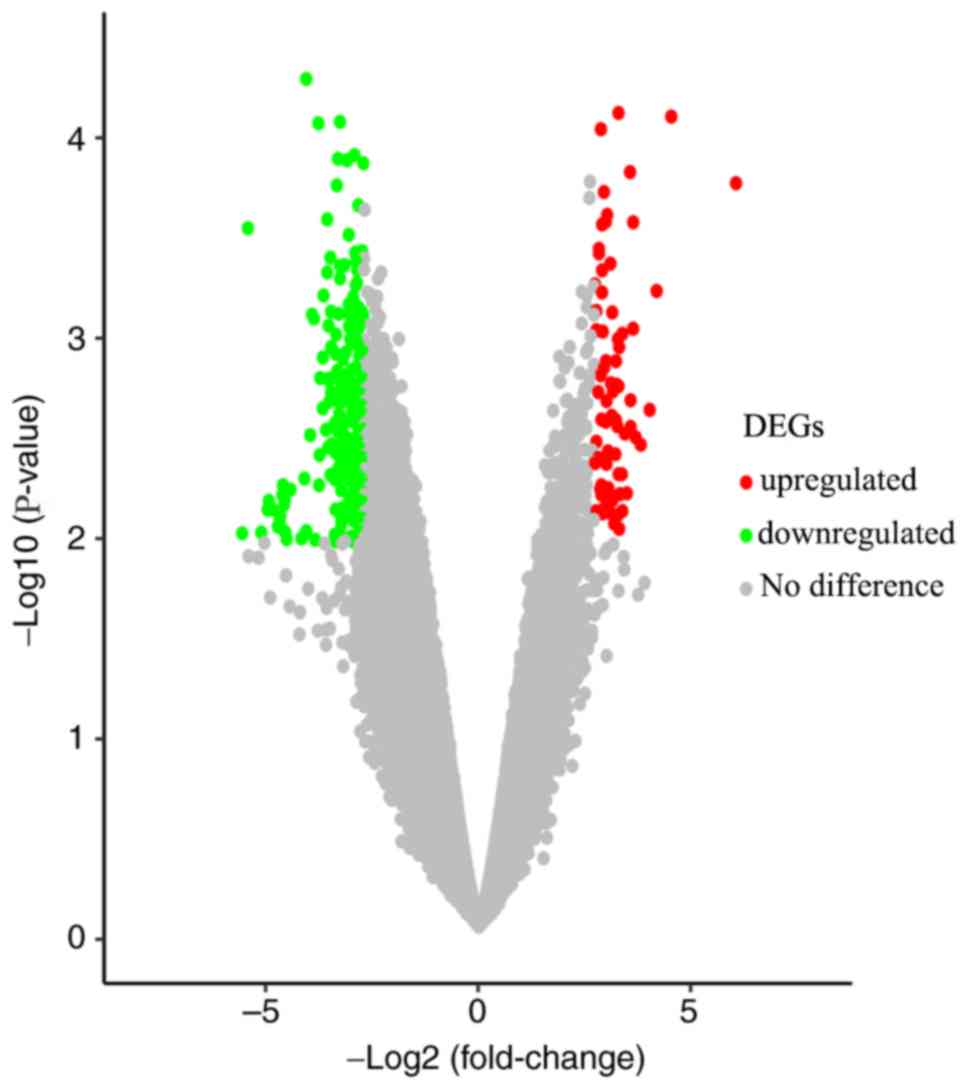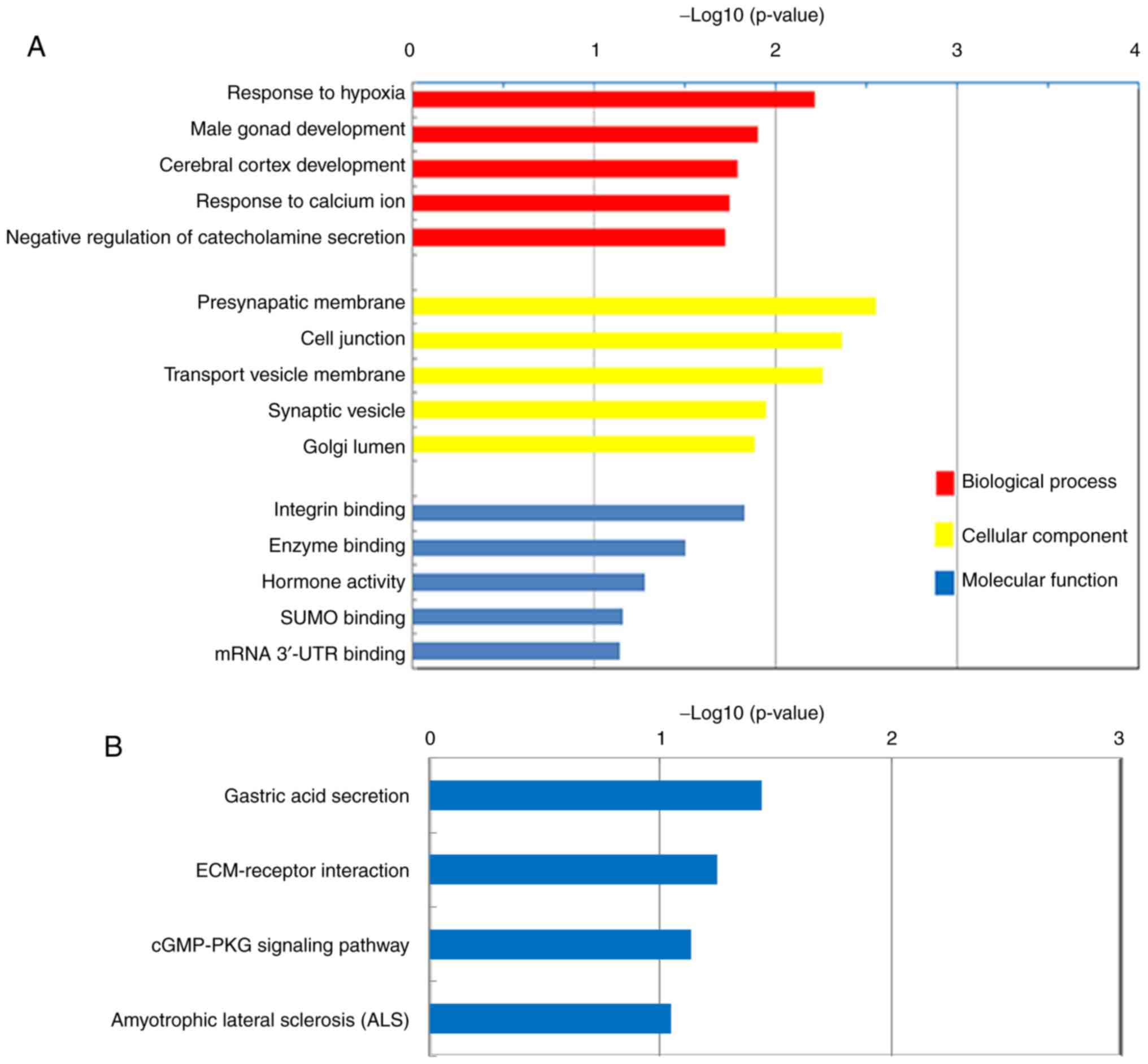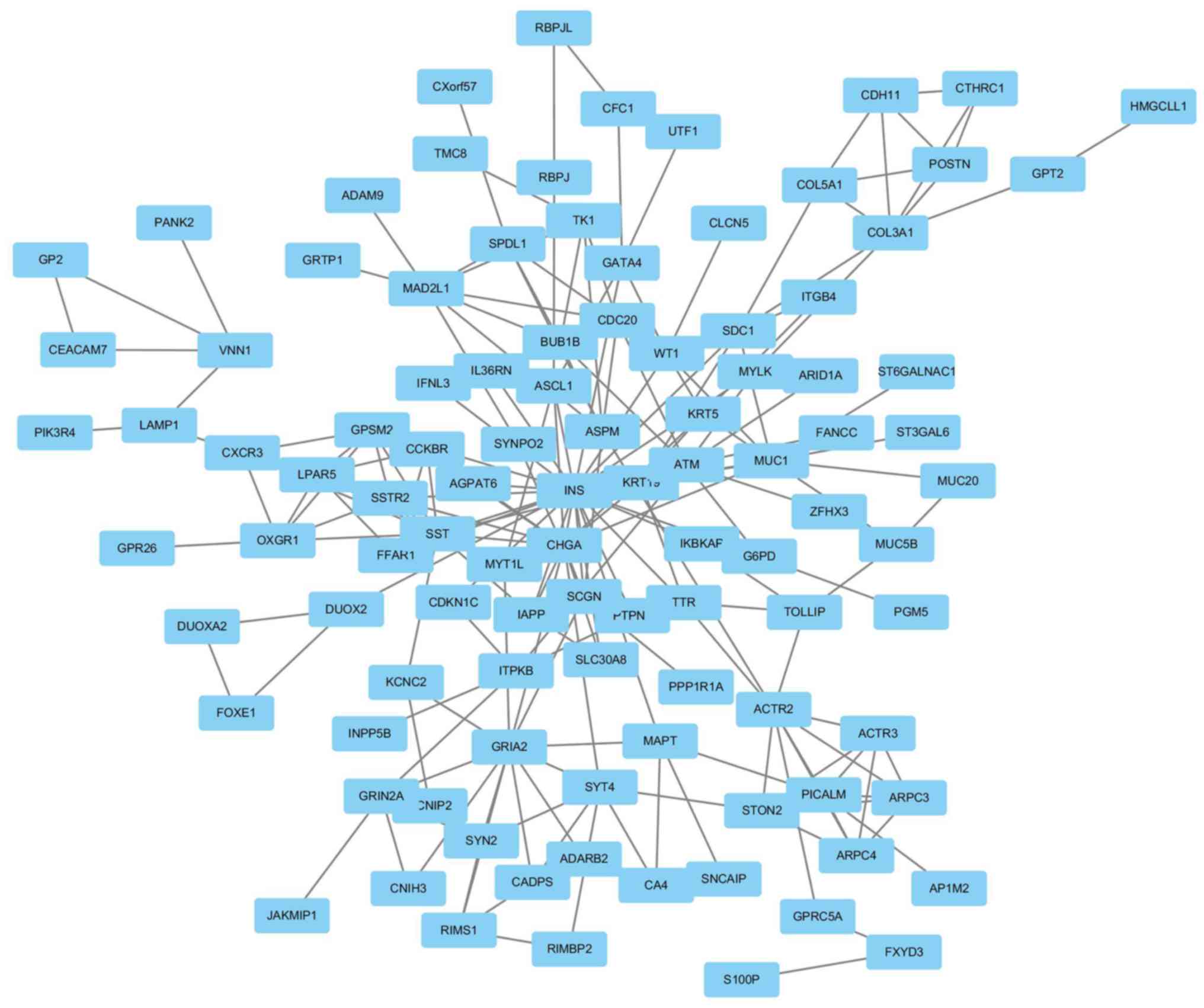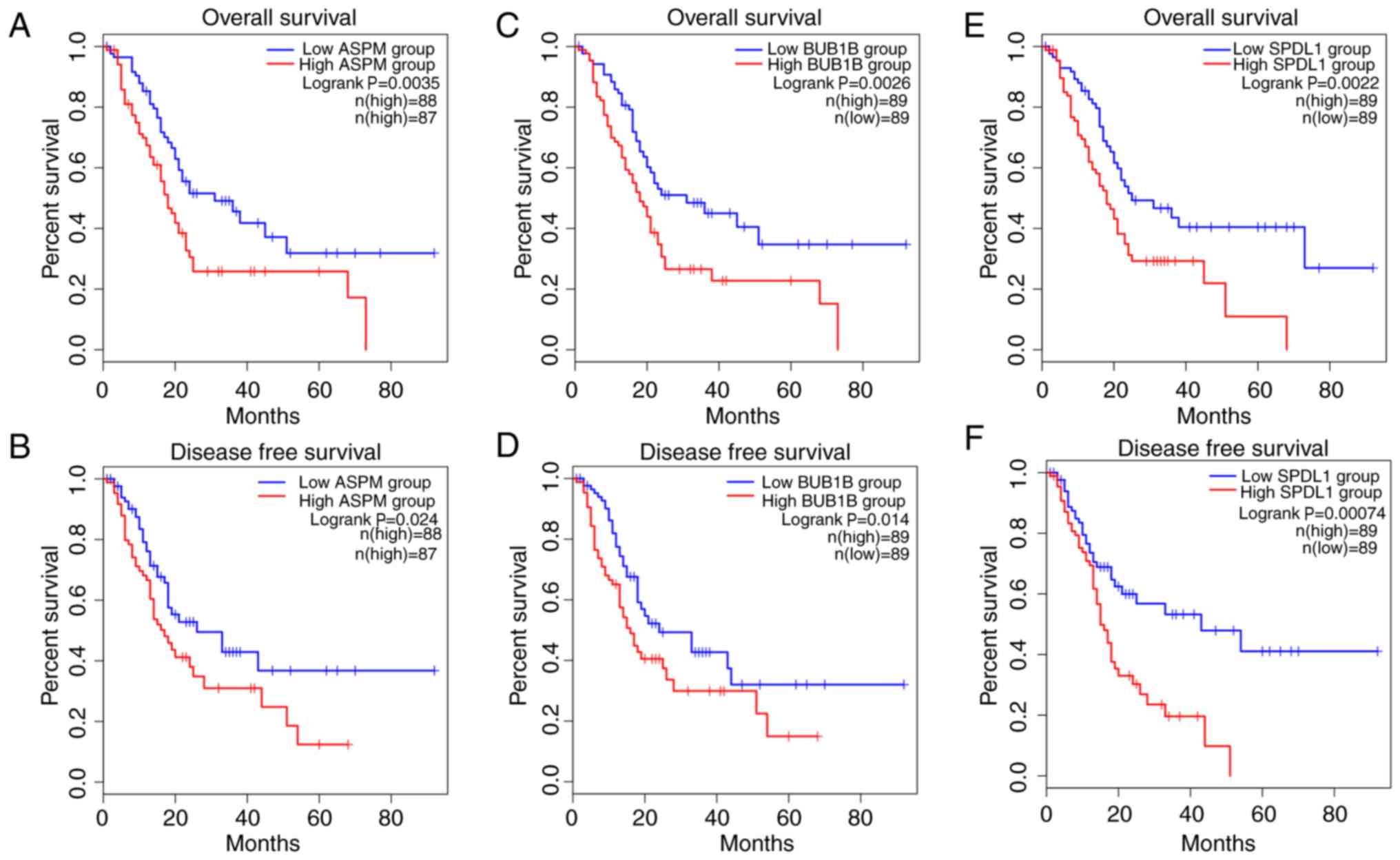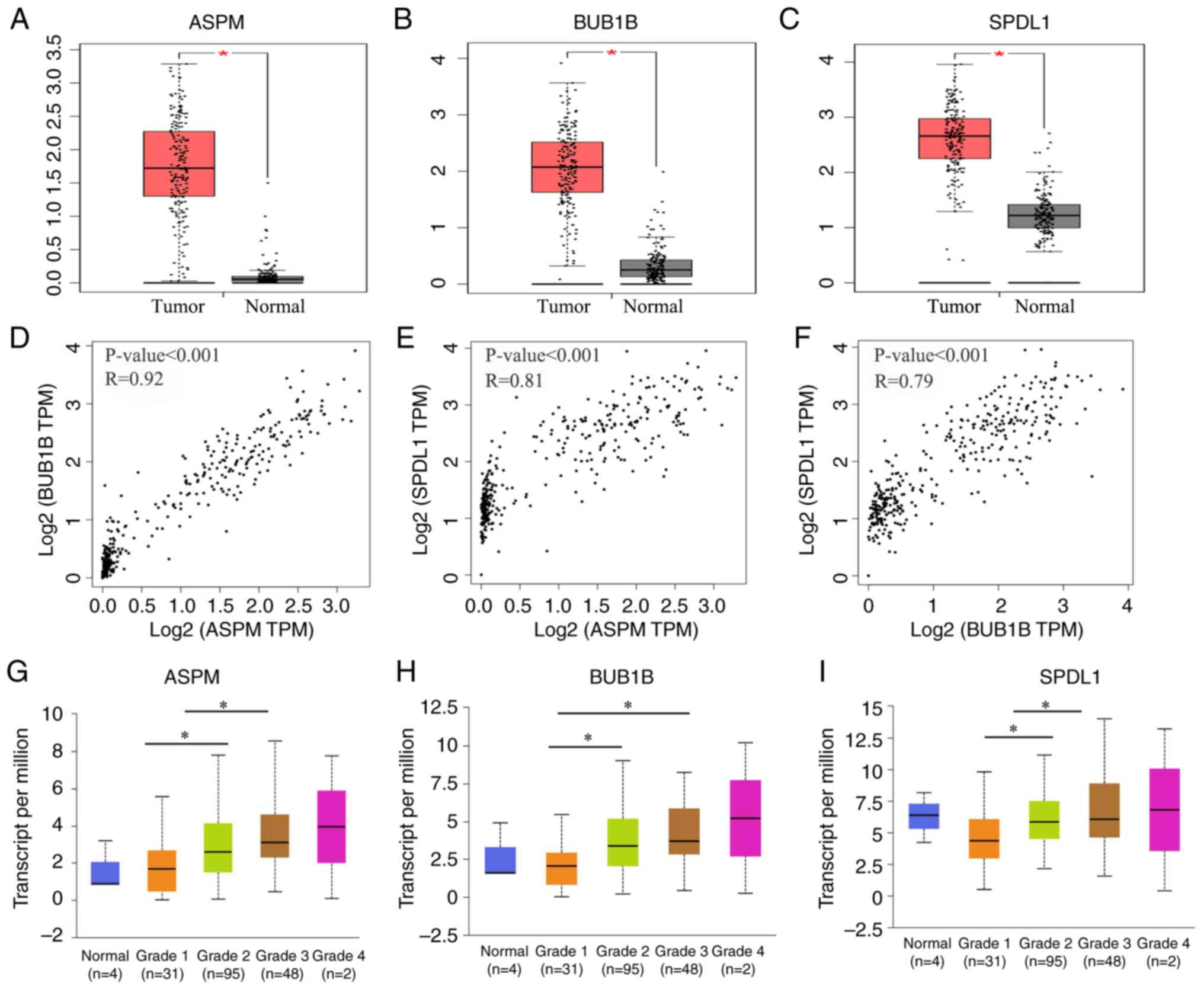|
1
|
Siegel RL, Miller KD and Jemal A: Cancer
statistics, 2018. CA Cancer J Clin. 68:7–30. 2018. View Article : Google Scholar : PubMed/NCBI
|
|
2
|
Bray F, Ferlay J, Soerjomataram I, Siegel
RL, Torre LA and Jemal A: Global cancer statistics 2018: GLOBOCAN
estimates of incidence and mortality worldwide for 36 cancers in
185 countries. CA Cancer J Clin. 68:394–424. 2018. View Article : Google Scholar : PubMed/NCBI
|
|
3
|
Howlader N, Noone AM, Krapcho M, Miller D,
Brest A, Yu M, Ruhl J, Tatalovich Z, Mariotto A, Lewis DR, Chen HS,
Feuer EJ and Cronin KA: SEER Cancer Statistics Review, 1975–2011.
National Cancer Institute; Bethesda, MD: 2019
|
|
4
|
Pozios I, Knösel T, Zhao Y, Assmann G,
Pozios I, Müller MH, Bruns CJ, Kreis ME and Seeliger H: Expression
of phosphorylated estrogen receptor beta is an independent negative
prognostic factor for pancreatic ductal adenocarcinoma. J Cancer
Res Clin Oncol. 144:1887–1897. 2018. View Article : Google Scholar : PubMed/NCBI
|
|
5
|
Kasuga A, Hamamoto Y, Takeuchi A, Kawasaki
K, Suzuki T, Hirata K, Sukawa Y, Takaishi H and Kanai T: Positive
relationship between subsequent chemotherapy and overall survival
in pancreatic cancer: Meta-analysis of postprogression survival for
first-line chemotherapy. Cancer Chemother Pharmacol. 79:595–602.
2017. View Article : Google Scholar : PubMed/NCBI
|
|
6
|
Karakas Y, Lacin S and Yalcin S: Recent
advances in the management of pancreatic adenocarcinoma. Expert Rev
Anticancer Ther. 18:51–62. 2018. View Article : Google Scholar : PubMed/NCBI
|
|
7
|
Ruckert MT, de Andrade PV, Santos VS and
Silveira VS: Protein tyrosine phosphatases: Promising targets in
pancreatic ductal adenocarcinoma. Cell Mol Life Sci. 76:2571–2592.
2019. View Article : Google Scholar : PubMed/NCBI
|
|
8
|
Biankin AV, Waddell N, Kassahn KS, Gingras
MC, Muthuswamy LB, Johns AL, Miller DK, Wilson PJ, Patch AM, Wu J,
et al: Pancreatic cancer genomes reveal aberrations in axon
guidance pathway genes. Nature. 491:399–405. 2012. View Article : Google Scholar : PubMed/NCBI
|
|
9
|
Jones S, Zhang X, Parsons DW, Lin JC,
Leary RJ, Angenendt P, Mankoo P, Carter H, Kamiyama H, Jimeno A, et
al: Core signaling pathways in human pancreatic cancers revealed by
global genomic analyses. Science. 321:1801–1806. 2008. View Article : Google Scholar : PubMed/NCBI
|
|
10
|
Heiser PW, Cano DA, Landsman L, Kim GE,
Kench JG, Klimstra DS, Taketo MM, Biankin AV and Hebrok M:
Stabilization of beta-catenin induces pancreas tumor formation.
Gastroenterology. 135:1288–1300. 2008. View Article : Google Scholar : PubMed/NCBI
|
|
11
|
Liu Y, Wu X, Wang G, Hu S, Zhang Y and
Zhao S: CALD1, CNN1, and TAGLN identified as potential prognostic
molecular markers of bladder cancer by bioinformatics analysis.
Medicine (Baltimore). 98:e138472019. View Article : Google Scholar : PubMed/NCBI
|
|
12
|
Tell RW and Horvath CM: Bioinformatic
analysis reveals a pattern of STAT3- associated gene expression
specific to basal-like breast cancers in human tumors. Proc Natl
Acad Sci USA. 111:12787–12792. 2014. View Article : Google Scholar : PubMed/NCBI
|
|
13
|
Gentleman R and Ihaka R: R: A language and
environment for statistical computing. Computing. 1:12–21.
2011.
|
|
14
|
Saura M, Marquez S, Reventun P,
Olea-Herrero N, Arenas MI, Moreno-Gómez-Toledano R, Gómez-Parrizas
M, Muñóz-Moreno C, González-Santander M, Zaragoza C and Bosch RJ:
Oral administration of bisphenol A induces high blood pressure
through angiotensin II/CaMKII-dependent uncoupling of eNOS. FASEB
J. 28:4719–4728. 2014. View Article : Google Scholar : PubMed/NCBI
|
|
15
|
von Mering C, Huynen M, Jaeggi D, Schmidt
S, Bork P and Snel B: STRING: A database of predicted functional
associations between proteins. Nucleic Acids Res. 31:258–261. 2003.
View Article : Google Scholar : PubMed/NCBI
|
|
16
|
Shannon P, Markiel A, Ozier O, Baliga NS,
Wang JT, Ramage D, Amin N, Schwikowski B and Ideker T: Cytoscape: A
software environment for integrated models of biomolecular
interaction networks. Genome Res. 13:2498–2504. 2003. View Article : Google Scholar : PubMed/NCBI
|
|
17
|
Tang Z, Li C, Kang B, Gao G, Li C and
Zhang Z: GEPIA: A web server for cancer and normal gene expression
profiling and interactive analyses. Nucleic Acids Res. 45:W98–W102.
2017. View Article : Google Scholar : PubMed/NCBI
|
|
18
|
Allen PJ, Kuk D, Castillo CF, Basturk O,
Wolfgang CL, Cameron JL, Lillemoe KD, Ferrone CR, Morales-Oyarvide
V, He J, et al: Multi-institutional validation study of the
American Joint Commission on Cancer (8th Edition) changes for T and
N staging in patients with pancreatic adenocarcinoma. Ann Surg.
265:185–191. 2017. View Article : Google Scholar : PubMed/NCBI
|
|
19
|
Livak KJ and Schmittgen TD: Analysis of
relative gene expression data using real-time quantitative PCR and
the 2(-Delta Delta C(T)) Method. Methods. 25:402–408. 2001.
View Article : Google Scholar : PubMed/NCBI
|
|
20
|
Tanemura M, Miyoshi E, Nagano H, Eguchi H,
Matsunami K, Taniyama K, Hatanaka N, Akamatsu H, Mori M and Doki Y:
Cancer immunotherapy for pancreatic cancer utilizing α-gal
epitope/natural anti-Gal antibody reaction. World J Gastroenterol.
21:11396–11410. 2015. View Article : Google Scholar : PubMed/NCBI
|
|
21
|
Li N, Zhao X and You S: Identification of
key regulators of pancreatic ductal adenocarcinoma using
bioinformatics analysis of microarray data. Medicine (Baltimore).
98:e140742019. View Article : Google Scholar : PubMed/NCBI
|
|
22
|
Sakamoto T, Saito H, Amisaki M, Tokuyasu
N, Honjo S and Fujiwara Y: Combined preoperative
platelet-to-lymphocyte ratio and serum carbohydrate antigen 19-9
level as a prognostic factor in patients with resected pancreatic
cancer. Hepatobiliary Pancreat Dis Int. 18:278–284. 2019.
View Article : Google Scholar : PubMed/NCBI
|
|
23
|
Piao J, Zhu L, Sun J, Li N, Dong B, Yang Y
and Chen L: High expression of CDK1 and BUB1 predicts poor
prognosis of pancreatic ductal adenocarcinoma. Gene. 701:15–22.
2019. View Article : Google Scholar : PubMed/NCBI
|
|
24
|
Yin X, Wang M, Wang H, Deng H, He T, Tan
Y, Zhu Z, Wu Z, Hu S and Li Z: Evaluation of neurotensin receptor 1
as a potential imaging target in pancreatic ductal adenocarcinoma.
Amino Acids. 49:1325–1335. 2017. View Article : Google Scholar : PubMed/NCBI
|
|
25
|
Ueda M, Fukushima T, Ogawa K, Kimura H,
Ono M, Yamaguchi T, Ikehara Y and Saji H: Synthesis and evaluation
of a radioiodinated peptide probe targeting αvβ6 integrin for the
detection of pancreatic ductal adenocarcinoma. Biochem Biophys Res
Commun. 445:661–666. 2014. View Article : Google Scholar : PubMed/NCBI
|
|
26
|
Principe M, Borgoni S, Cascione M,
Chattaragada MS, Ferri-Borgogno S, Capello M, Bulfamante S,
Chapelle J, Di Modugno F, Defilippi P, et al: Alpha-enolase (ENO1)
controls alpha v/beta 3 integrin expression and regulates
pancreatic cancer adhesion, invasion, and metastasis. J Hematol
Oncol. 10:162017. View Article : Google Scholar : PubMed/NCBI
|
|
27
|
Liu H, Naxerova K, Pinter M, Incio J, Lee
H, Shigeta K, Ho WW, Crain JA, Jacobson A, Michelakos T, et al: Use
of angiotensin system inhibitors is associated with immune
activation and longer survival in nonmetastatic pancreatic ductal
adenocarcinoma. Clinical Cancer Res. 23:5959–5969. 2017. View Article : Google Scholar
|
|
28
|
Tang F, He Z, Lei H, Chen Y, Lu Z, Zeng G
and Wang H: Identification of differentially expressed genes and
biological pathways in bladder cancer. Mol Med Rep. 17:6425–6434.
2018.PubMed/NCBI
|
|
29
|
Kouprina N, Pavlicek A, Collins NK, Nakano
M, Noskov VN, Ohzeki J, Mochida GH, Risinger JI, Goldsmith P,
Gunsior M, et al: The microcephaly ASPM gene is expressed in
proliferating tissues and encodes for a mitotic spindle protein.
Hum Mol Genet. 14:2155–2165. 2005. View Article : Google Scholar : PubMed/NCBI
|
|
30
|
Raman P, Maddipati R, Lim KH and Tozeren
A: Pancreatic cancer survival analysis defines a signature that
predicts outcome. PLoS One. 13:e02017512018. View Article : Google Scholar : PubMed/NCBI
|
|
31
|
Brüning-Richardson A, Bond J, Alsiary R,
Richardson J, Cairns DA, McCormack L, Hutson R, Burns P, Wilkinson
N, Hall GD, et al: ASPM and microcephalin expression in epithelial
ovarian cancer correlates with tumor grade and survival. Br J
Cancer. 104:1602–1610. 2011. View Article : Google Scholar : PubMed/NCBI
|
|
32
|
Wang WY, Hsu CC, Wang TY, Li CR, Hou YC,
Chu JM, Lee CT, Liu MS, Su JJ, Jian KY, et al: A gene expression
signature of epithelial tubulogenesis and a role for ASPM in
pancreatic tumor progression. Gastroenterology. 145:1110–1120.
2013. View Article : Google Scholar : PubMed/NCBI
|
|
33
|
Bikeye SN, Colin C, Marie Y, Vampouile R,
Ravassard P, Rousseau A, Boisselier B, Idbaih A, Calvo CF, Leuraud
P, et al: ASPM-associated stem cell proliferation is involved in
malignant progression of gliomas and constitutes an attractive
therapeutic target. Cancer Cell Int. 10:12010. View Article : Google Scholar : PubMed/NCBI
|
|
34
|
Lin SY, Pan HW, Liu SH, Jeng YM, Hu FC,
Peng SY, Lai PL and Hsu HC: ASPM is a novel marker for vascular
invasion, early recurrence, and poor prognosis of hepatocellular
carcinoma. Clin Cancer Res. 14:4814–4820. 2008. View Article : Google Scholar : PubMed/NCBI
|
|
35
|
Yu M, Ting DT, Stott SL, Wittner BS,
Ozsolak F, Paul S, Ciciliano JC, Smas ME, Winokur D, Gilman AJ, et
al: RNA sequencing of pancreatic circulating tumor cells implicates
WNT signaling in metastasis. Nature. 487:510–513. 2012. View Article : Google Scholar : PubMed/NCBI
|
|
36
|
Long J, Zhang Z, Liu Z, Xu Y and Ge C:
Identification of genes and pathways associated with pancreatic
ductal adenocarcinoma by bioinformatics analyses. Oncol Lett.
11:1391–1397. 2016. View Article : Google Scholar : PubMed/NCBI
|
|
37
|
Dong S, Huang F, Zhang H and Chen Q:
Overexpression of BUB1B, CCNA2, CDC20, and CDK1 in tumor tissues
predicts poor survival in pancreatic ductal adenocarcinoma. Biosci
Rep. 39:2019. View Article : Google Scholar
|
|
38
|
Pinto M, Vieira J, Ribeiro FR, Soares MJ,
Henrique R, Oliveira J, Jerónimo C and Teixeira MR: Overexpression
of the mitotic checkpoint genes BUB1 and BUBR1 is associated with
genomic complexity in clear cell kidney carcinomas. Cell Oncol.
30:389–395. 2008.PubMed/NCBI
|
|
39
|
Scintu M, Vitale R, Prencipe M, Gallo AP,
Bonghi L, Valori VM, Maiello E, Rinaldi M, Signori E, Rabitti C, et
al: Genomic instability and increased expression of BUB1B and
MAD2L1 genes in ductal breast carcinoma. Cancer Lett. 254:298–307.
2007. View Article : Google Scholar : PubMed/NCBI
|
|
40
|
Yamamoto Y, Matsuyama H, Chochi Y, Okuda
M, Kawauchi S, Inoue R, Furuya T, Oga A, Naito K and Sasaki K:
Overexpression of BUBR1 is associated with chromosomal instability
in bladder cancer. Cancer Genet Cytogenet. 174:42–47. 2007.
View Article : Google Scholar : PubMed/NCBI
|
|
41
|
Barisic M, Sohm B, Mikolcevic P, Wandke C,
Rauch V, Ringer T, Hess M, Bonn G and Geley S: Spindly/CCDC99 is
required for efficient chromosome congression and mitotic
checkpoint regulation. Mol Biol Cell. 21:1968–1981. 2010.
View Article : Google Scholar : PubMed/NCBI
|
|
42
|
Silva PMA, Delgado ML, Ribeiro N, Florindo
C, Tavares ÁA, Ribeiro D, Lopes C, do Amaral B, Bousbaa H and
Monteiro LS: Spindly and Bub3 expression in oral cancer: Prognostic
and therapeutic implications. Oral Dis. 25:1291–1301. 2019.
View Article : Google Scholar : PubMed/NCBI
|















